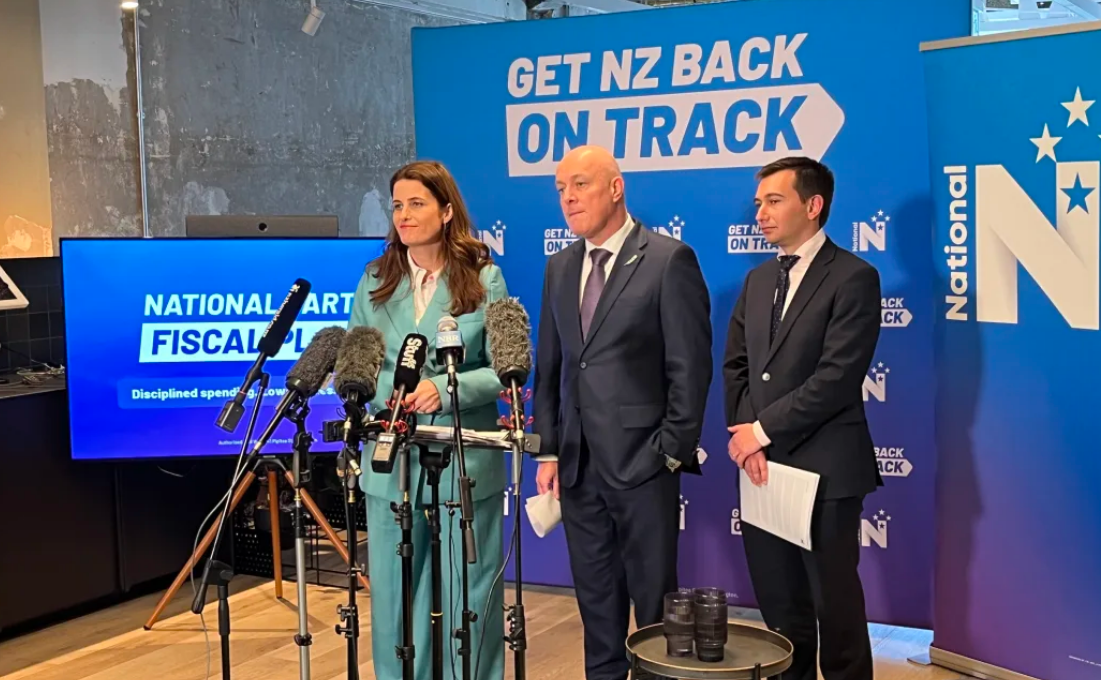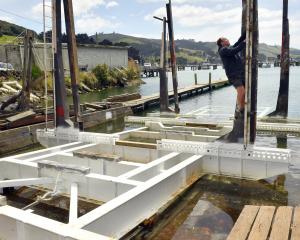The National Party has released its fiscal plan, saying it will lower taxes, reduce net debt and bring discipline to government spending.
In a media conference held this afternoon, National leader Christopher Luxon said his party knows "you can't spend your way to a strong economy, just like in your own household you can't spend your way into a better financial position".
"National will reduce the allocation for new spending in upcoming budgets, but will also still put money where New Zealanders need it, and will put more into health and more into education every year."
Finance spokesperson Nicola Willis said while there had been "inflation adjustments for many, taxpayers have still not had tax thresholds inflation-adjusted".
As for transport funding, Willis said National would take a different route than Labour.
"We are not prepared to increase petrol taxes next term. That is the last thing that New Zealanders struggling through a cost of living crisis need."
She said National would return to indexing main benefits to inflation.

"There is funding available in the capital allowance for potential future allocations but as previously signalled by Chris Bishop, we want to first do a complete review of Kāinga Ora's approach to delivery of social housing. We have concerns about the efficiency with which they are doing this."
There is a commitment to increase frontline spending on health and education, and to match Labour's plan to allow for $1.4 billion for cost pressures in health.
National said it would spend less than Labour each year, by more than $3 billion over four years.
One way it would save money is to change the way benefits are calculated, returning to indexing benefits to inflation rather than wages, saving $2b over the forecast period.
Willis said future budgets would make room for schools and hospitals that needed more funding.
"National's disciplined approach results in a forecast $3.4 billion reduction in debt compared to Labour in 2027/28."
She said under National, a $2.9 billion surplus is forecast for 2026/27 which was "$0.8 billion higher than Labour".
"We have provided for significant buffers, with $9.9b of unallocated operating spending to ensure we can respond to cost pressures and changing circumstances."
Benefits
National said it would commit to raising benefits every year, even though it is going to cut the amount it would spend on them.
"We're going to increase benefits every year we are in office to ensure that they keep up with the cost of living," Willis said.
It would also return to indexing benefits to inflation rather than wage growth, which would save $2 billion over the forecast period.
She said National was also going to deal with the underlying causes of the cost-of-living crisis, "including not adding more petrol tax ... not continuing to add more taxes to landlords that have accelerated rents".
On social housing, Willis said: "We're maintaining the existing social housing capital allocations in Budget 2023/24 and 24/25. There is funding available in the capital allowance for potential future allocations but as previously signalled by Chris Bishop, we want to first do a complete review of Kāinga Ora's approach to delivery of social housing.
"We have concerns about the efficiency with which they are doing this."
Luxon said would also look at increasing housing stock supply "so that we put downward pressure on housing costs as well".
On subsidised prescriptions, Luxon said people would still be able to access subsidised prescriptions.
"We're saying people that can afford to pay, should pay for them, and the money that we raise through that is how we'll fund 13 new cancer treatments."

Mini Budget before Christmas, reduce departmental spending
If elected, Willis said National would deliver a mini Budget before Christmas "in which we set out some of the savings and reprioritisations that we believe are necessary to get New Zealand back on track".
"We've identified 24 agencies where collectively their departmental costs - not their outputs, not the funding they're giving to external services - that's the cost of running themselves have collectively risen by more than 60 percent. What we're proposing is that they reduce the costs of running themselves by 6.5 percent on average.
"The process we will run in the leadup to Christmas, is we will ask chief executives together with senior public servants to identify those areas in their own departments where they can make savings. We'll have those recommendations come up to ministers ... [who] will be ultimately accountable for decision making."
Luxon said Labour measured success by how much money was being spent, whereas National measured success by the results that were achieved.
"We're going to have better public service targets across all of our public services in New Zealand so that everybody is focused on the outcomes. Having that set of outputs in place, that's what we want CEOs to then be ruthlessly focused on, sharpening their organisations to deliver against that.
"That means stopping dumb projects that don't lead to those outcomes ... not filling in vacancies, moving the 200 comms staff out to 200 nurses on the frontline.
"We want everything out of the back office, into the frontline delivering on those targets."
National's five fiscal principles
1. Return to surplus and reduce debt - National will achieve a surplus in 2026/27, reduce government debt (down $3.4 billion compared with Pre-Election Economic and Fiscal forecasts) and provide buffers in future spending allowances.
2. Support frontline services - National will support frontline services, and prioritise increases in funding for health and education to account for inflation.
3. Invest in infrastructure - National will invest in infrastructure to boost productivity and contribute to New Zealand's economic recovery, including making a $3.7b contribution to the National Land Transport Fund.
4. Restore discipline to government spending - National will reduce spending on bureaucracy, better manage social welfare expenditure, and end funding for failed programmes like Auckland Light Rail.
5. Deliver tax relief for hard-working Kiwis - National will provide tax relief up to $250 a fortnight for an average-income family with young children in childcare.
The plan has been independently reviewed by Castalia, that also did the review of National's tax plan.
The Green Party will also release its fiscal plan later today.












